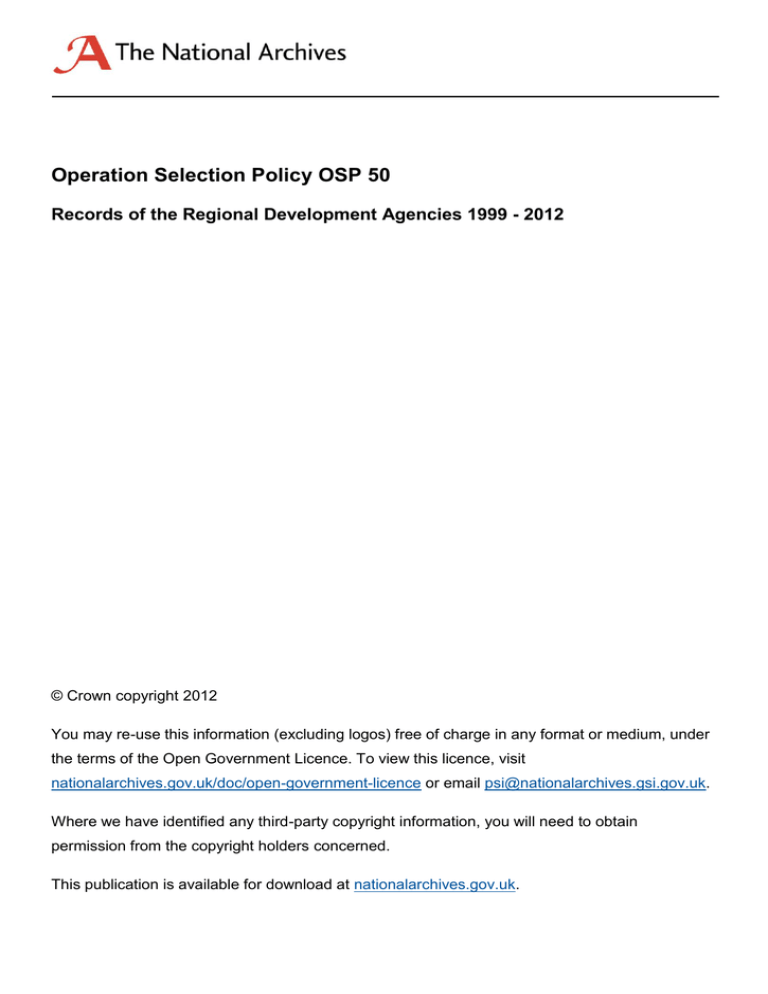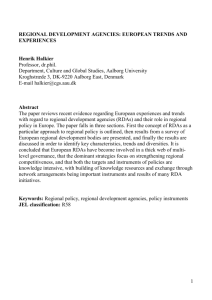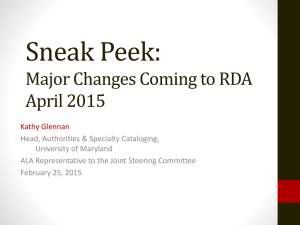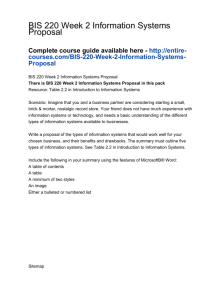Operation Selection Policy OSP 50
advertisement

Operation Selection Policy OSP 50 Records of the Regional Development Agencies 1999 - 2012 © Crown copyright 2012 You may re-use this information (excluding logos) free of charge in any format or medium, under the terms of the Open Government Licence. To view this licence, visit nationalarchives.gov.uk/doc/open-government-licence or email psi@nationalarchives.gsi.gov.uk. Where we have identified any third-party copyright information, you will need to obtain permission from the copyright holders concerned. This publication is available for download at nationalarchives.gov.uk. OSP 50 Records of the Regional Development Agencies 1999 - 2012 Document Authority The National Archives Acquisition and Disposition policy statements published in 2000 (revised and updated in 2007 as the Acquisition and Disposition Strategy) announced the intention of developing, in consultation with departments, operational selection policies (OSPs) across government. These policies would apply the collection themes described in the policy to the records of individual departments and agencies. OSPs are intended to be working tools for those involved in the selection of public records. Therefore this policy may be reviewed and revised in the light of comments received from the users of records or from archive professionals, the department’s experience of using the policy, or as a result of newly discovered information. This policy is a presentation version of an Appraisal Report. Appraisal Reports have been developed to implement The National Archives’ Appraisal Policy published in August 2004. They are designed to provide structured information about the responsibilities, work and records of an organisation so that appraisers can identify records of potential historical value. They provide a transparent record of decisions on the selection of records, in whatever format, for permanent preservation. Selection decisions are based on the requirement to document the work of the organisation and to provide information about specific topics of potential long-term interest. If you have any comments on this policy please email information.management@nationalarchives.gsi.gov.uk Contents Executive summary........................................................................................................................ 3 Section 1: Background information ................................................................................................ 5 Section 2: Material transferred to The National Archives in the past ........................................... 11 Section 3: Analysis of records produced ...................................................................................... 11 Section 4: Proposals for the selection of records ......................................................................... 23 Section 5: Additional information and follow-up ........................................................................... 24 Last updated March 2012 Page 2 of 26 OSP 50 Records of the Regional Development Agencies 1999 - 2012 Executive summary The work of the Regional Development Agencies (RDAs) has a significant impact on the economic growth and condition of England. The RDAs strengthen regional economies to create prosperity in the regions. They do this in two ways: firstly, through strategic leadership, bringing together the views of the people who live and work in the regions and combining these with a unique set of business and economic insights to make sure that each region is able to make the most of the opportunities which are available; and secondly, through distributing the massive UK budget (over £2 billion) and European funds (£2.5 billion). Both of these activities support their Regional Economic Strategies. They also seek to influence national policies which have a relevance to regional development. Their records have a historical value because the RDAs handle very large sums of public money and it is important that The National Archives captures documentation on its expenditure. Also, as the lead regional bodies for coordinating activities around inward investment, improving the skills of the workforce and improving business competition, they are shaping the face of the regions. Through the social, physical and economic regeneration of the regions the RDAs are driving economic growth, employment and productivity to bring increased prosperity. The National Archives will record these changes and their impact on the regions. The work of the RDAs falls within the following Acquisition Criteria themes in the Acquisition and Disposition Strategy. 3.1.4 Regulation and support of economic activity by government, including industry, services, agriculture, transport, energy, trade and employment and productivity 3.2 Interaction of the state with its citizens and its impact on and documentation of the physical environment 3.2.1 The economic, social and demographic condition of the UK, as documented by the state’s dealings with individuals, communities and organisations outside its own formal boundaries Last updated March 2012 Page 3 of 26 OSP 50 Records of the Regional Development Agencies 1999 - 2012 Select records to reflect the RDAs role in developing the Regional Economic Strategies. The discussions on them and their consideration will be captured through the papers of the statutory Boards and Executive Committees for each of the RDAs. Select records of the decisions made on investment proposals so that there is a record of how and why these decisions are made. Select records of the meetings of the RDA Chairs and RDA Chief Executives managed by the RDA Co-ordination Unit (Secretariat). These are top-level meetings considering policy issues which impact on all the RDAs and also reflect the RDAs relationship and interaction with Ministers. The Sub-National Review (2007) and the Single Integrated Regional Strategy reinforce the position of RDAs as the strategic leads for economic development and planning in their regions but will require changes to the way in which the Agency works. Records of the RDAs’ consideration and implementation of the Review and the Strategy will be selected. In 2010 the Government announced its commitment to building a new economic model for subnational regional development resulting in the abolition of the RDAs and the creation of Local Enterprise Partnerships. Select records of any Board created to manage the transition. The RDAs have no involvement in developing policy on or drafting legislation. However, each RDA has a responsibility for advising government on particular aspects of national policy as it impacts on regional development, for example, on transport. Select records of this policy advice. At an operational level the RDAs work through a series of programmes and projects in order to deliver the Regional Economic Strategy. The records which will be selected are those projects/programmes funded either by UK government or the EU which have a national impact or have a financial value of more than £50 million. They are likely to have been highlighted in the Annual Report. Select records relating to projects/programmes which are either preventative or are in response to a particular crisis for example, closure of MG Rover, foot and mouth disease, flooding. The British Library will hold RDA publications: Regional Economic Strategies, Corporate and Business Plans and Annual Reports and policy documents. Last updated March 2012 Page 4 of 26 OSP 50 Records of the Regional Development Agencies 1999 - 2012 Section 1: Background information 1.1 Name of Agency/NDPB/Department/Division Regional Development Agencies – this is a generic Appraisal Report. 1.2 Type of agency Executive Non-Departmental agency Public Body 1.3 Trading Fund Next Steps Agency Non-Ministerial bodies Libraries, Museums, Galleries Research Councils Annual budget (if an Agency) Since April 2002 the RDAs have been financed through a single programme budget (the ‘Single Pot’). This replaced the funding programme that existed previously through which each contributing government department’s allocation was made. Money from the contributing departments, Department for Business, Innovation and Skills (BIS), Communities and Local Government (CLG), Department for Innovation, Universities and Science (DIUS) (merged with BIS in June 2009), Department for Environment, Food and Rural Affairs (DEFRA), Department for Culture, Media and Sport (DCMS) and UKTI (UK Trade and Investment) is pooled into one single budget. Most of the money is provided by CLG and to a much lesser degree by the other departments. Once the money is allocated it is available to the RDAs to spend as they see fit to achieve their targets. The total contribution made in 2007-8 was £2,310 million. From 2007 the RDAs took on responsibility for managing the Competitiveness and Employment programmes of the European Regional Development Fund (ERDF) with CLG as the designated Management Authority for all ERDF structural funds programmes. The programmes for 2000-2006 had been delivered through the Government Offices (GOs). Last updated March 2012 Page 5 of 26 OSP 50 Records of the Regional Development Agencies 1999 - 2012 The fund has a budget of £2.5 billion and aims to stimulate economic development in less prosperous regions of the EU. The RDAs are also responsible for the deployment of the Rural Development Programme for England (2007-2013) under delegation from Defra. The total budget for this programme is £3.9 billion. In addition the RDAs act as conduits for funding schemes such as the Selective Finance for Investment in England (from October 2008 the Grants for Business Investment) (Assisted Areas only) and grants for research and development. 1.4 Number of employees The number of staff employed by each RDA is between 300 and 400. 1.5 Hybrid Records Possible. 1.6 Background, functions and activities The (then) Deputy Prime Minister, John Prescott, announced the new programme for the regions in December 1997, launching the paper, Building partnerships for prosperity. The eight Regional Development Agencies (RDAs) were subsequently established under the Regional Development Agencies Act 1998, and were formally launched in eight English regions on 1 April 1999. The ninth, in London, was formed in July 2000 following the establishment of the Greater London Authority (GLA). The RDAs took over the regional activities of English Partnerships, the Rural Development Commission and the Single Regeneration Budget Challenge and Skills Development Fund formerly administered by the Government Offices for the region. Last updated March 2012 Page 6 of 26 OSP 50 Records of the Regional Development Agencies 1999 - 2012 1.7 The RDAs The nine agencies are: Advantage West Midlands Northwest Regional Development Agency Yorkshire Forward One North East East Midlands Development Agency East of England Development Agency South West of England Regional Development Agency South East England Development Agency London Development Agency The RDAs are bodies corporate whose constitution and purposes are laid down in the Act. Under section 4 (1) of the Act each Agency has five statutory purposes, which are to: further the economic development and the regeneration of its area promote business efficiency, investment and competitiveness in its area promote employment in its area enhance the development and application of skills relevant to employment contribute to the achievement of sustainable development in the United Kingdom where it is relevant to its area to do so Their primary role is as strategic drivers of regional economic development in their region. The RDAs aim to co-ordinate regional economic development and regeneration, enable the regions to improve their relative competitiveness and reduce the imbalance that exists within and between regions. They support business development and competitiveness by encouraging public and private investment, and by connecting people to economic opportunity. They work to improve levels of education, learning and skills, and to enhance the region’s environment and infrastructure. Last updated March 2012 Page 7 of 26 OSP 50 Records of the Regional Development Agencies 1999 - 2012 The Act also requires the RDAs to develop a new strategic vision: the Regional Economic Strategy (RES) for each of their regions using statutory guidance issued for their formulation. The first strategies were presented to the Government in 1999 and are reviewed every three years. The strategies are implemented through a Corporate Plan which provides details of how the RDAs will allocate their budgets to deliver progress in meeting the objectives and targets in the RES. Activities typical of an RDA are: the launch of a Science Strategy, which aims to position the region as an international centre of excellence the development of a Business Link - a new business support service for the region, designed to increase the number of businesses and individuals accessing business support helping to safeguard the future of a car plant supporting the development of Regeneration Zones intended to transform the economy by supporting large-scale physical renewal and coordinating other elements of socio-economic regeneration activity supporting major developments in the region’s Higher Education infrastructure, including a new University increasing the number of people with graduate level skills In 2010 the Government announced its commitment to building a new economic model by reforming the system of sub-national economic development. Councils and businesses working together in Local Enterprise Partnerships will replace the RDAs. Some RDA functions will be carried out by BIS while others will cease. The Public Bodies Act 2011 confers on Ministers the power to make provision by order to abolish the RDAs. It is proposed that the London Development Agency will be folded into the Greater London Assembly. An RDA Co-ordination Unit (Secretariat) supports the activities of the RDA Chairs and Chief Executives when dealing with cross-RDA issues and issues which impact on the Last updated March 2012 Page 8 of 26 OSP 50 Records of the Regional Development Agencies 1999 - 2012 national agenda by coordinating the arrangements for the Chairs and Chief Executives to meet collectively. 1.8 Name of the parent or sponsoring department (if an Agency). If none, Minister who lays an annual report before Parliament RDAs are currently sponsored by BIS. Up to 2001 responsibility for the sponsorship of the RDAs lay with the former Department for the Environment, Transport and the Regions. The Secretary of State for BIS lays an annual report before Parliament. 1.9 Relationship with parent department (if an Agency) The Secretary of State for BIS is accountable to Parliament for the RDAs’ activities and performance. Board members are appointed by the Secretary of State who also approves the appointment of the Chief Executive, the terms and conditions of the Board members and staff Six monthly monitoring reports on progress made on the priorities identified in the Regional Economic Strategy are made to Government and laid before Parliament BIS assesses how effectively the RDAs are performing their functions BIS provides guidance on the development of Regional Economic Strategies BIS approves the RDAs’ strategic objectives and the policy and performance framework within which the Agency will operate (as set out in the Management Statement and Financial Memorandum and associated documents) BIS approves the amount of grant-in aid/grant/other funds to be paid to the RDAs and secures Parliamentary approval BIS monitors propriety in the expenditure of public money BIS’s relationship with the RDAs is conducted through the RDA Sponsorship and Finance Directorate. Last updated March 2012 Page 9 of 26 OSP 50 Records of the Regional Development Agencies 1999 - 2012 Projects which exceed the RDAs’ financial delegation or are novel or contentious must be submitted for review by the Central Policy Review Group (CPRG). The CPRG is an interdepartmental group chaired by BIS responsible for ensuring quality assurance and valuefor-money for all EP projects as well as all Regional Development Agencies (RDAs) projects resourced from the single pot. It assesses/appraises all projects above the RDAs delegation level (currently £10m). It acts alone on projects up to £20m, but Treasury approval is also required for those above £20m or those judged to be novel, contentious or repercussive. 1.10 Relationship with other organisations (agencies /NDPBs /departments /other statutory bodies) The RDAs work with many partners to achieve the priorities in the RES for example, the former English Partnerships, the new Housing and Communities Agency and in rural areas National Park Authorities and Areas of Outstanding Natural Beauty Conservation Boards, local authorities, other RDAs, higher education sector and the Learning and Skills Council and community and volunteer groups. Government Offices The GOs are inter-departmental bodies representing 11 Whitehall departments. They are headed by the Regional Co-ordination Unit of CLG. There is a GO in each region which is the primary point of contact for the RDAs particularly providing advice in a national policy context. It also monitors its performance and receives six monthly reports on progress from the RDAs. The GOs also support and work with the RDAs and other stakeholders to achieve regional and national policy objectives. It was announced in the Comprehensive Spending Review 2010 that the GOs will be closed by the end of March 2011 Regional assemblies The regional assemblies were designated to provide regional accountability for the work of the RDAs. They were abolished in March 2010 and were replaced by Local Authority Leaders’ Boards. They too have been abolished (June 2010) but may be replaced by voluntary associations of council leaders Last updated March 2012 Page 10 of 26 OSP 50 Records of the Regional Development Agencies 1999 - 2012 Regional Economic Council The Council (October 2008-May 2010) was established to ensure that the issues and concerns of each region were heard and acted upon across Government. It brought together Regional Ministers, RDA chairs, representatives of business and trade unions and was chaired by the Chancellor and BIS’s Secretary of State. It was closely linked to the National Economic Council, providing a quarterly update on economic activity in the regions and sharing concerns from the regions with Government so that it could inform national policy responses. Section 2: Material transferred to The National Archives in the past No records have been transferred to The National Archives. Section 3: Analysis of records produced 3.1 Committee structure within the agency or parent department, including statutory committees directing the work of the organisation Table 3. 1: Key committees Name of committee Terms of reference Select? Reasons for selection/ Yes/No non-selection, including comments on the quality of information Board Sets strategic direction of RDAs and high level objectives (statutory board established by RDA Act 1998) Yes Last updated March 2012 Sets overall direction and policy of RDAs Page 11 of 26 OSP 50 Records of the Regional Development Agencies 1999 - 2012 Audit Committee Ensures adequate financial and non-financial internal control systems are in place and receives assurance on RDAs’ systems of corporate governance, risk management and internal control No Remuneration Ensures that adequate Committee arrangements are in place for the performance and remuneration of the Directors and the Chief Executive No Executive Management Board/ Corporate Management Team Makes key decisions, agrees actions and specific initiatives, and reviews financial performance, monitors corporate risks’ approves policies and procedures. Make recommendations to the Board on strategy, policy and resources Yes Investment Decision Group Considers and decides on all investment proposals and projects Yes Select as provides record of all decisions made Projects over £1million are submitted to the Board Chief Executives meetings managed by the RDA Coordination Unit Discussion of strategic and operational issues which apply to all RDAs Last updated March 2012 Yes Select as provides a record of xRDA discussions at a strategic level Page 12 of 26 OSP 50 Records of the Regional Development Agencies 1999 - 2012 Board Chairs - managed by the RDA Coordination Unit Discussion on ways to advise Government on moving forward policy that will benefit all the regions and with Ministers to raise policy issues that impact on economic regeneration Yes High level discussion of cross-RDA policy issues and interaction with Government 3.2 Areas of policy work undertaken in the Agency Type of policy RDAs play major consultative role in the development of primary legislation directly associated with its role Yes/No No RDAs develop secondary legislation No RDAs provide advice on carrying out primary or secondary legislation provisions No RDAs provide advice to help government understand the needs and priorities of England’s regions, for the Budget and regional funding and spending priorities. Each RDA has a lead role for a national policy area for example, skills and employment, energy Yes Last updated March 2012 Selection and notes Select policy development and interaction with Government for each RDA’s lead policy area for example, transport for Advantage West Midlands Page 13 of 26 3.3 Operational work undertaken by the agency Table 3.3: Operational work of the agency and records created 1. 2. 3. 4. 5. 6. 7. Operational activity Detail of activity Information recorded in case work files Is the information captured through or replicated in a database? Yes or No and enter details under 3.4 Is the information captured through or replicated in publications including the Annual Report? Give details Selection? Yes/No Reasons for selection/nonselection Providing part or full funding for projects in order to deliver the Regional Economic Strategy Appraisal of projects in line with Single Programme Appraisal Guidance (SPAG) Project files with common structure No Case studies on websites and brief details of key developments in Annual Report Yes – select projects where the RDA’s contribution is more than £50 million and those with a national impact. Examples are assistance to car industry following Rover closure and the Eden Project Most significant projects in financial terms and likely impact on region will be selected as well as those with a national importance Developing programmes, partnerships, collaboration with eg higher education sector, support systems, support, PPP and PFI, providing guidance and information, securing locations, inward Programme files Programme files with common structure No Case studies on websites and brief details of key developments in Annual Report Yes - select programmes where the RDA’s contribution is more than £50 million eg development of regeneration zones, Science City and high technology corridors Most significant projects in financial terms and likely impact on region will be selected OSP 50 Records of the Regional Development Agencies 1999 - 2012 1. 2. 3. 4. 5. 6. 7. Operational activity Detail of activity Information recorded in case work files Is the information captured through or replicated in a database? Yes or No and enter details under 3.4 Is the information captured through or replicated in publications including the Annual Report? Give details Selection? Yes/No Reasons for selection/nonselection Acting as managing agent and in administration of European Regional Development Funds (ERDF) and European Social Funds (ESF) and Selective Payments and projects files No Case studies on websites and brief details of key developments in Annual Report Yes - Select programmes with a financial value of more than £50 million – some regions were designated Objective 1 for EU funding and subsequently are part of the Convergence Programme (ERDF and ESF) The records of the Industrial Development Advisory Board which considers Selective Finance Investment scheme applications above £2 million (previously Regional Selective Assistance scheme) will be selected by BIS. The investment and skills for new business, monitoring outcomes in order to deliver the Regional Economic Strategy Making payments/loans in response to applications Last updated March 2012 Page 15 of 26 OSP 50 Records of the Regional Development Agencies 1999 - 2012 1. 2. 3. 4. 5. 6. 7. Operational activity Detail of activity Information recorded in case work files Is the information captured through or replicated in a database? Yes or No and enter details under 3.4 Is the information captured through or replicated in publications including the Annual Report? Give details Selection? Yes/No Reasons for selection/nonselection Finance for Investment in England (below £2 million) most significant projects in financial terms and likely impact on region will be selected for those regions targeted by the EU Managing property (other than its own administrative sites) Buying properties for sale or demolition as part of regeneration work Property file No No No Part of projects above Preventative or remedial work Development of regeneration On project files No Case studies on websites and brief details of key work Yes, select those of national importance, or example MG Rover closure, foot and mouth, RDAs response to slow and immediate changes in the Last updated March 2012 Page 16 of 26 OSP 50 Records of the Regional Development Agencies 1999 - 2012 1. 2. 3. 4. 5. 6. 7. Operational activity Detail of activity Information recorded in case work files Is the information captured through or replicated in a database? Yes or No and enter details under 3.4 Is the information captured through or replicated in publications including the Annual Report? Give details Selection? Yes/No Reasons for selection/nonselection in Annual Report flooding regional economy and workforce should be captured zones, establishment of Task Forces to help workforce, economy etc in cases of sudden closure or slow decline of industries Commissioning research Yes see 3.5 below Last updated March 2012 Page 17 of 26 3.4 Electronic systems System Yes/No Electronic Document and Records Management System At various stages of implementation in the RDAs Enterprise Content Management System See above Shared Drives Yes used where EDRM not implemented Personal drives Yes Collaboration systems Workflow with EDRMs where implemented Email systems Yes Datasets including GIS Not known but unlikely CAD systems No Wikis No Blogs No Case management systems Yes - see below Portable media (such as laptops, blackberries, memory sticks) Yes HR and Finance systems Yes - see below Digital audio, film and photograph collections Photograph and image libraries used for publicity and publications Other OSP 50 Records of the Regional Development Agencies 1999 - 2012 Datasets Name of database Information contained of historical value Selection Yes/ No Reasons for selection/ non-selection FOR AWM only PMS To manage project expenditure No Routine administration Sales Logix CRM database Replaced by Tractivity No Routine administration Resource Manages agency finances No Routine administration Contracts database Manages funding projects a Recfind database for registration only No Routine administration T Image Library On websites for use of partners, businesses to use for marketing and PR purposes. Not to be selected. Website(s) http://www.advantagewm.co.uk/ http://www.nwda.co.uk/ http://www.yorkshire-forward.com/ http://www.onenortheast.co.uk/ http://www.emda.org.uk/main/ http://www.eeda.org.uk/ http://www.southwestrda.org.uk/ http://www.seeda.co.uk/ http://www.lda.gov.uk/ Last updated March 2012 Page 19 of 26 OSP 50 Records of the Regional Development Agencies 1999 - 2012 The websites for the RDAs will be crawled as part of the three-monthly archiving of government websites. 3.5 Publications produced by the organisation Table 3.5: Types of publications and preservation strategies 1. Types of publications 2. Important to preserve? 3. Reasons for answer in column 2 Yes / No Standards N/A Inspections N/A Guidance/ codes of practice N/A Training manuals, curricula N/A Annual reports Yes Regional economic strategies, corporate plans and policy documents Yes Last updated March 2012 4. Preservation at The National Archives or British Library At British Library These set out the RDAs’ strategies and work plans and are used to measure their success. Contain very detailed description of plans and performance and give an overall view of the economic situation in the region At British Library Page 20 of 26 OSP 50 Records of the Regional Development Agencies 1999 - 2012 3.6 Main output is public information, for example museums, archives N/A Trade journals N/A Newsletters No Scientific records None 3.7 Significant policy issues for the period of appraisal The Sub-National Review The Government’s Review of Sub-National Economic Development and Regeneration (SNR), published in July 2007, and its subsequent consultation document, Prosperous Places (published 31 March 2008), set out proposals for boosting economic performance through a series of reforms aimed at improving the articulation of plans and actions at regional, sub-regional and local levels. It reinforced the position of RDAs as the strategic leads for economic development in their regions and for developing an integrated regional strategy – the Single Regional Strategy (SRS). It required changes to the way in which RDAs would work in the future with a broader, strategic role envisaged by the SNR in cooperation with local authorities, taking on regional responsibility for spatial planning and delegating responsibility for funding to local authorities and sub-regions. The agency would also be taking on Regional Planning Body status. Activity would increasingly be developed at a programme rather than a project level. These proposed changes were significant for the RDAs and their responsibilities. Some RDAs established a joint board with local authorities (for example, The Joint Strategy and Investment Board at Advantage West Midlands) to oversee all aspects of SNR development and delivery, for other RDAs governance remained with Strategy Board and Executive Committee. Last updated March 2012 Page 21 of 26 OSP 50 Records of the Regional Development Agencies 1999 - 2012 Select the records of Boards (where established) to steer the implementation of the SNR and SRS. Reform of the system of sub-national economic development In 2010 the Government announced the abolition of the RDAs and their replacement with newly created Local Enterprise Partnerships (LEPs) as part of the building of a new economic model for the regions. LEPs are joint local-authority-business bodies brought forward by local authorities to promote local economic development. Local businesses and councils are being encouraged to develop their proposals for LEPs which will provide the strategic leadership in their areas in setting out local economic priorities. The London Development Agency may be folded into the Greater London Assembly. Select the records of the board (where established) to manage the transition from the RDAs to LEPs or the GLA. The 2012 Olympic Games Under the umbrella Nations and Regions Group the RDAs are planning for the 2012 Games aims to ensure that the Games will deliver benefits to all in the regions, promote the UK through the business, sporting and cultural assets of the regions and to leave a lasting legacy. Some RDAs are more advanced than others in developing structures to make the most of the opportunities. For example, Advantage West Midlands has established a Leadership and an Advisory Group. The National Archives is currently engaged in the development of a National Collections Strategy for the records of the 2012 Olympics but it is likely that some records relating to the RDAs’ contribution will be selected. The selection policy for records created by the RDAs in delivering the 2012 Games will be the subject of a separate Operational Selection Policy. Last updated March 2012 Page 22 of 26 OSP 50 Records of the Regional Development Agencies 1999 - 2012 3.8 Internal administration records The principles outlined in the Operational Selection Policy on Records of Internal Administration (OSP38) are that records relating to this subject will be selected from the ‘lead’ department. However, ‘non-lead’ departments continue to have the discretion to select records. Major structural change in the RDAs will be recorded in the records of the RDA Board and Executive Management Board which will be selected as will the records of any Boards established to manage the abolition of the RDAs. Section 4: Proposals for the selection of records Strategic agendas, minutes and papers of the RDA Board agendas, minutes and papers of the RDA Executive Committee minutes/decisions of the Investment Decision Group or equivalent agendas, minutes and papers of the meetings of the Chairs of the RDA Boards agendas, minutes and papers of the meetings of the Chief Executives of the RDAs Strategic/Policy Select records of the Board (where established) which oversaw all aspects of the SNR development and delivery. Select records of the Board (where established) to manage the transition from the RDAs to LEPs. Policy Records of policy development for each RDA’s lead policy area. Last updated March 2012 Page 23 of 26 OSP 50 Records of the Regional Development Agencies 1999 - 2012 Operational project files created in the delivery of the Regional Economic Strategy: those where the RDA’s contribution is more than £50 million and those with a national impact programme files created in the delivery of the Regional Economic Strategy: those with a value of more than £50 million project files created in the course of remedial or preventative work to help the economy, its workforce and skills project/programme files created in the management of the European Regional Development Fund: those with a value of more than £50 million Websites Will be crawled for all the RDAs. Publications The British Library will hold published documents such as the Regional Economic Strategy, Regional Transport Strategy, Economic Indicators, Designing our environment. Section 5: Additional information and follow-up 5.1 Additional Checks The Operational Selection Policy for English Partnerships (OSP 45) recommended that papers of the highest level Boards and committees should be selected. The Board papers detail discussion of and decisions made on the strategic direction of EP while the Committees consider both policy direction and programmes and projects. EP functions through a series of national programmes and the selection of records from the file series created for them together with the committee papers will ensure that policy decisions and the related case files on the expenditure of massive public funds are captured. This OSP mirrors the selection policy for EP. Last updated March 2012 Page 24 of 26 OSP 50 Records of the Regional Development Agencies 1999 - 2012 5.2 Implications of this report for the selection of records held in related departments/ agencies BIS has the lead responsibility for regional economic development and monitors the work of the RDAs. Policy records relating to the former and records concerned with government’s relationship, monitoring and support for the RDAs will be selected from BIS. The Secretariat for the Regional Economic Council is provided jointly by BIS and HM Treasury. As BIS has responsibility for regional economic policy and works in close partnership with regional bodies to increase sustainable economic development the agendas, minutes and papers of the meetings of the Regional Economic Council will be selected from BIS. The Central Policy Review Group, chaired by BIS, evaluates all projects above the RDAs delegation level. Records of this process will be selected from BIS. 5.3 Implications of the report for the review and selection of paper records relating to the functions covered here Covers both paper and electronic records. 5.4 Follow-up The RDAs will be abolished by March 2012. 5.5 Disposition In line with the deposit of the records of other regional organisations at local places of deposit, the selected records of the Regional Development Agencies will be held in the regions to which they relate. They can be used in conjunction with other local material and will form an important locally held source for historians studying regional and sub-regional economies. Selected records of the RDA Coordination Unit which operated on behalf of all the RDAs and fulfilled a national role will be held at The National Archives. Last updated March 2012 Page 25 of 26 OSP 50 Records of the Regional Development Agencies 1999 - 2012 Table of the RDAs and the receiving record offices Regional Development Agency Local Record Office London Development Agency London Metropolitan Archives South West of England Regional Development Agency Wiltshire and Swindon History Centre One North East Tyne and Wear Archive Service Yorkshire Forward West Yorkshire Archive Service East Midlands Development Agency Nottinghamshire Archives Advantage West Midlands Birmingham Archives and Heritage Service Northwest Regional Development Agency Cheshire Record Office South East England Development Agency Surrey History Centre East of England Development Agency Last updated March 2012 Norfolk Record Office Page 26 of 26





